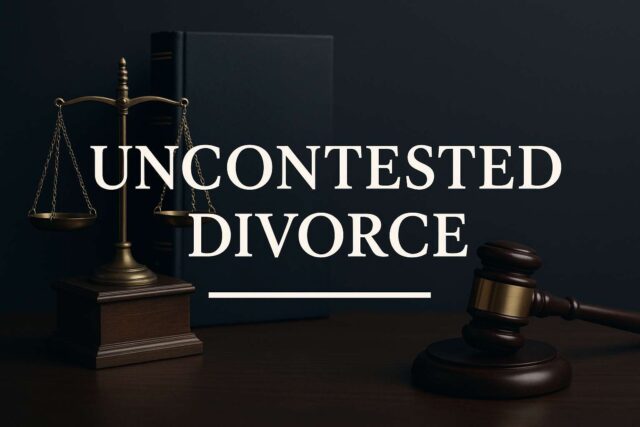
For many, a divorce is the most complicated, emotionally charged legal matter they will ever face. If you’re going through a divorce, you have a lot to consider, but one of the most important decisions you have to make is the team of lawyers you choose to represent you. Here at the Law Offices of Gruber, Colabella, Thompson, Hiben & Montella, our Sussex County family lawyers have decades of experience serving clients throughout Sussex, Morris, Somerset, and Warren Counties facing divorce and other family law matters, and we’re here to put that experience to work for you. Contact our divorce lawyers for a free initial consultation today.
Contested Divorce Vs. Uncontested Divorce in New Jersey
When you’re preparing to file for divorce in New Jersey, one of the first things you’ll need to understand is whether your divorce will be contested or uncontested. This distinction significantly impacts how the process unfolds, how long it takes, and how much it will cost.
An uncontested divorce occurs when both spouses agree on all major issues — including property division, child custody and parenting time, child support, and spousal support (alimony). This doesn’t mean the couple has to start out agreeing on everything; many uncontested divorces involve negotiations facilitated by attorneys or through mediation. However, by the time the case is filed and proceeds to judgment, there is no dispute requiring court intervention. Because there is agreement on all relevant issues, uncontested divorces are typically faster, less expensive, and far less emotionally draining.
A contested divorce, on the other hand, arises when the spouses are unable to agree on one or more key issues. This could involve disagreements over financial matters, child custody, the grounds for divorce, or any combination of the above. In a contested divorce, the court may need to step in and resolve disputes through hearings and possibly a trial. As a result, contested divorces tend to be more complex, time-consuming, and costly than their uncontested counterparts.
It’s important to note that many divorces begin as contested but ultimately settle before trial. Our experienced Sussex County divorce lawyers work to protect your rights while also exploring every opportunity for resolution that spares you from prolonged litigation. Whether your case is straightforward or contentious, we’re prepared to guide you through each step with clarity, compassion, and strategic advocacy.
Fault Grounds in New Jersey
New Jersey offers couples both fault and no-fault grounds for divorce; however, fault rarely has any impact upon the distribution of assets or alimony (spousal support) negotiation during the divorce.
In New Jersey, the following circumstances are acceptable grounds for divorce that you will want to discuss with your lawyer if they apply to your marriage:
- Adultery
- Legal separation for 18 months (consecutive)
- Deviant sexual behavior/sexual problems
- Extreme cruelty (in some cases this is the same as irreconcilable differences in other states)
- Drug or alcohol intoxication/addiction for 12 months (consecutive)
- Imprisonment for 18 months (consecutive)
- Irreconcilable Differences
- Willful desertion for a minimum of a year
- Mental illness institutionalization for a minimum of 24 months (consecutive)
The Contested Divorce Process in New Jersey
A contested divorce in New Jersey involves a multi-stage legal process designed to resolve disputes between spouses when they cannot agree on one or more key aspects of their divorce. The process can be emotionally difficult and legally complex, which is why having the right legal representation is critical. Below is a step-by-step overview of what to expect during a contested divorce in New Jersey.
Filing the Complaint for Divorce
The process begins when one spouse (the “plaintiff”) files a Complaint for Divorce in the Superior Court of New Jersey, Family Division. This legal document outlines the grounds for divorce (either fault or no-fault) and may include the plaintiff’s positions on issues such as custody, support, and property distribution. The filing must be accompanied by a Confidential Litigant Information Sheet and a Case Information Statement (CIS), which details the financial circumstances of the party.
Service of Process
Once the complaint is filed, the plaintiff must serve the divorce papers on the other spouse (the “defendant”), either personally or through a process server. The defendant then has 35 days to file an Answer, a Counterclaim, or another appropriate response.
Case Management and Early Settlement Panel (ESP)
After both sides have responded, the court will schedule a Case Management Conference (CMC). During this initial hearing, the judge sets a timeline for the case, identifies the issues in dispute, and outlines discovery deadlines. The goal is to keep the case moving efficiently and ensure that both parties exchange the necessary financial and factual information.
One of the court-mandated steps in most contested divorce cases is participation in an Early Settlement Panel (ESP). The ESP is a panel of experienced family law attorneys who volunteer their time to help litigants resolve their financial disputes. Each side presents their case to the panel, and the panelists offer a non-binding recommendation for settlement. While the parties are not required to accept the recommendation, many divorces settle at or shortly after this stage.
Discovery Phase
The discovery phase allows both parties to gather information and evidence relevant to the divorce. This may include interrogatories (written questions), depositions (sworn testimony), requests for documents, and expert evaluations — especially when business valuations, real estate appraisals, or custody evaluations are involved. Discovery ensures that both sides have access to the same set of facts, which is essential for reaching fair outcomes on contested issues.
Custody and Parenting Time Disputes
If there are disagreements regarding child custody or parenting time, the court may require the parties to attend custody mediation through the Family Court. If mediation fails to produce an agreement, the court may appoint a guardian ad litem, a custody evaluator, or order a best interests evaluation by a psychologist. These evaluations can play a significant role in the court’s determination of what custody arrangement serves the child’s best interests.
Motions and Interim Relief
During the pendency of the divorce, either party may file motions requesting temporary (pendente lite) relief. This can include requests for temporary spousal or child support, exclusive use of the marital home, attorney’s fees, or parenting time arrangements. The judge will rule on these motions based on affidavits and certifications, without a full trial, to maintain stability while the divorce is ongoing.
Intensive Settlement Conferences
Before proceeding to trial, the court may schedule an Intensive Settlement Conference (ISC). This is a final opportunity for the parties to resolve their disputes with the judge’s assistance before trial. The court strongly encourages settlement, and judges may actively participate in discussing the risks and potential outcomes of a trial to encourage compromise.
Trial
If no agreement can be reached, the case proceeds to a trial before a Family Court judge. Unlike criminal trials, there is no jury. Each party presents witnesses, documentary evidence, and legal arguments. The trial may last several days or even weeks, depending on the complexity of the issues. After reviewing all the evidence, the judge will issue a final decision on all unresolved matters, including alimony, equitable distribution, custody, child support, and any other contested issues.
Final Judgment of Divorce
Once the court rules on all outstanding issues — either through a settlement agreement or a trial decision — a Final Judgment of Divorce is entered. This legal document officially dissolves the marriage and incorporates the terms of the resolution, whether decided by the parties or the court.
Post-Judgment Modifications and Enforcement
Even after the divorce is finalized, issues may arise that require court intervention. A party may seek a modification of custody, support, or visitation based on a substantial change in circumstances. Alternatively, if one party is not complying with the terms of the judgment, the other may file an enforcement motion. Our firm continues to represent clients in post-judgment matters to ensure their rights remain protected.
Contact Our New Jersey Divorce Lawyers Today
Contact the attorneys at the Law Offices of Gruber, Colabella, Thompson, Hiben & Montella today to schedule your free consultation. Our team of Sussex County family law and divorce lawyers consists of some of the top litigators in the state, and we proudly represent individuals throughout Sussex, Somerset, Warren, and Morris Counties. If you’re going through a divorce, simply reach out to our firm today so we can begin working toward the best outcome possible on your behalf.
© 2025 Gruber, Colabella, Thompson, Hiben & Montella. All rights reserved. Attorney advertising.


